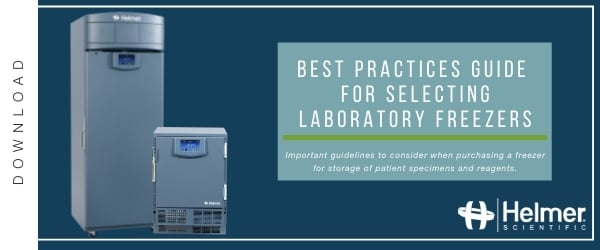In the clinical laboratory, the use of equipment designed for storing temperature-sensitive reagents and specimens is important for safeguarding their integrity and maintaining regulatory compliance. Storage within the correct temperature range is critical for ensuring accurate test results. In addition, the reagents required to run instruments represent a significant cost to the lab, which means it is important to reduce the risk of financial loss due to temperature excursions.
Freezers capable of storage temperatures of -20°C or below are needed for storing certain materials, depending on the manufacturer’s instructions. They are often used for longer-term storage. Three factors to consider when selecting freezers for your lab are reliable performance, energy savings (which impacts the total cost of ownership) along with sustainability, and regulatory compliance.
RELIABLE PERFORMANCE
Minimizing downtime and disruptions to workflow helps support operational efficiencies in the lab. All products from Helmer Scientific are designed and built to ensure they last for the long term. During the design process for GX Solutions professional medical-grade freezers, thorough Accelerated Life Testing (ALT) was conducted to ensure reliable performance.
ALT identifies and addresses possible issues before equipment is released for general use. It exposes units to very high levels of stress to challenge the system and ensures the unit’s design can withstand the rigors of daily use throughout a 10-year life.
SUSTAINABILITY & ENERGY SAVINGS
In addition to excellent performance characteristics, GX Solutions lab freezers support environmental sustainability. They utilize natural refrigerants that have no impact on ozone depletion and extremely low global warming potential (GWP).
GX Solutions also reduce energy consumption. For example, GX Solutions freezers are 35-45 percent more energy efficient than conventional medical-grade freezers and are ENERGY STAR® certified. This helps facilities reduce utility costs and lowers the total cost of ownership. They also eject less heat, limiting impact on heating, ventilation, and air conditioning (HVAC) systems.
REGULATORY COMPLIANCE
Reagents must be stored within the manufacturer’s specified temperature range to maintain their integrity and ensure compliance. The College of American Pathologists (CAP) All Common Checklist provides guidance on how these items should be stored. All reagents and media, for example, should be stored and handled as defined by the laboratory and following the manufacturer's instructions. If a reagent manufacturer specifies a required temperature range, the temperature must be monitored daily.
GX Solutions from Helmer Scientific support compliance by maintaining tight temperature uniformity throughout all storage locations within the cabinet, ensuring clinical products are stored within the required range.
In addition, GX Solutions are designed to recover quickly after frequent or prolonged door openings, which are common in a busy laboratory environment. The temperature is constantly monitored with high and low temperature alarms that activate if the temperature exceeds or falls below the alarm limits.
Other Blogs You Might Be Interested In...
- Centrifuge Solutions for Clinical Labs
- GX Solutions Undercounter Cold Storage Supports Operational Efficiencies
- Video Series: i.C3® Intelligent Monitoring for Clinical Labs
- GX Solutions Refrigerators Support Sustainability & Reduce Cost of Ownership
Visit GX Solutions from Helmer Scientific for more information on the performance and benefits of professional medical-grade cold storage. To learn more about frozen storage designed to support compliance while keeping your reagents safe, we have a guide reviewing best practices.





